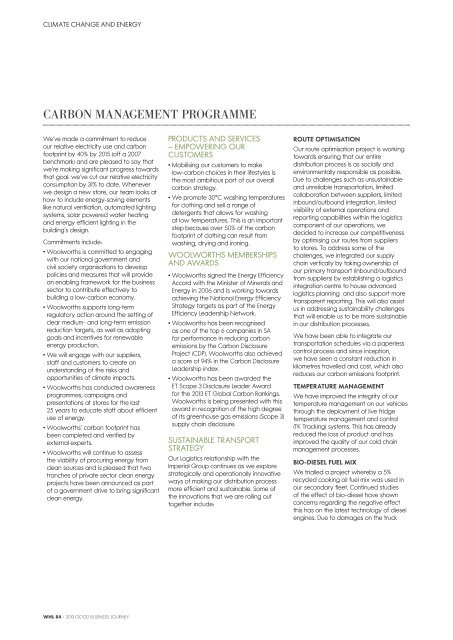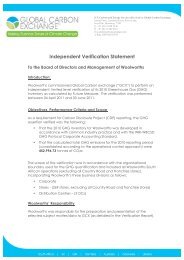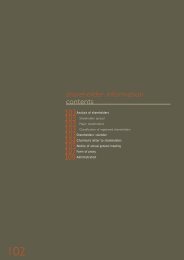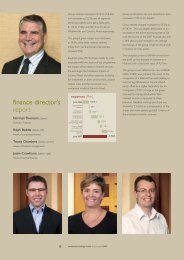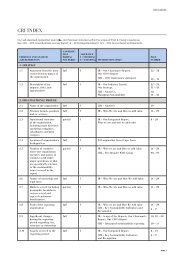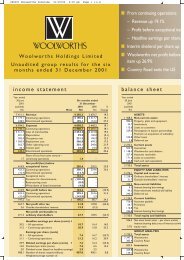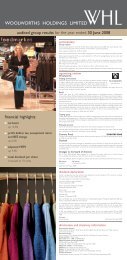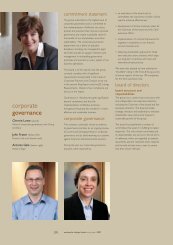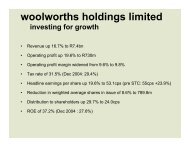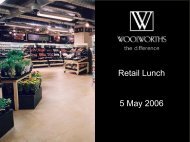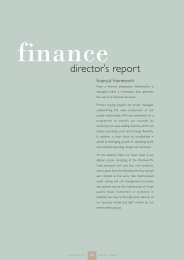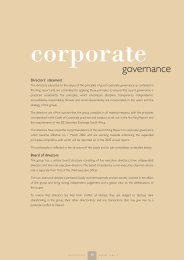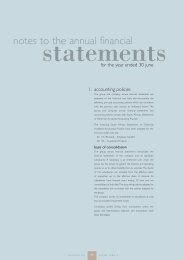WoolWorths holdings limited 2013 good BUsiness JoUrneY report
WoolWorths holdings limited 2013 good BUsiness JoUrneY report
WoolWorths holdings limited 2013 good BUsiness JoUrneY report
You also want an ePaper? Increase the reach of your titles
YUMPU automatically turns print PDFs into web optimized ePapers that Google loves.
climate change and energy<br />
CARBON MANAGEMENT PROGRAMME<br />
We’ve made a commitment to reduce<br />
our relative electricity use and carbon<br />
footprint by 40% by 2015 (off a 2007<br />
benchmark) and are pleased to say that<br />
we’re making significant progress towards<br />
that goal: we’ve cut our relative electricity<br />
consumption by 31% to date. Whenever<br />
we design a new store, our team looks at<br />
how to include energy-saving elements<br />
like natural ventilation, automated lighting<br />
systems, solar powered water heating<br />
and energy efficient lighting in the<br />
building’s design.<br />
Commitments include:<br />
• Woolworths is committed to engaging<br />
with our national government and<br />
civil society organisations to develop<br />
policies and measures that will provide<br />
an enabling framework for the business<br />
sector to contribute effectively to<br />
building a low-carbon economy.<br />
• Woolworths supports long-term<br />
regulatory action around the setting of<br />
clear medium- and long-term emission<br />
reduction targets, as well as adopting<br />
goals and incentives for renewable<br />
energy production.<br />
• We will engage with our suppliers,<br />
staff and customers to create an<br />
understanding of the risks and<br />
opportunities of climate impacts.<br />
• Woolworths has conducted awareness<br />
programmes, campaigns and<br />
presentations at stores for the last<br />
25 years to educate staff about efficient<br />
use of energy.<br />
• Woolworths’ carbon footprint has<br />
been completed and verified by<br />
external experts.<br />
• Woolworths will continue to assess<br />
the viability of procuring energy from<br />
clean sources and is pleased that two<br />
tranches of private sector clean energy<br />
projects have been announced as part<br />
of a government drive to bring significant<br />
clean energy.<br />
PRODUCTS AND SERVICES<br />
– EMPOWERING OUR<br />
CUSTOMERS<br />
• Mobilising our customers to make<br />
low-carbon choices in their lifestyles is<br />
the most ambitious part of our overall<br />
carbon strategy.<br />
• We promote 30°C washing temperatures<br />
for clothing and sell a range of<br />
detergents that allows for washing<br />
at low temperatures. This is an important<br />
step because over 50% of the carbon<br />
footprint of clothing can result from<br />
washing, drying and ironing.<br />
WOOLWORTHS MEMBERSHIPS<br />
AND AWARDS<br />
• Woolworths signed the Energy Efficiency<br />
Accord with the Minister of Minerals and<br />
Energy in 2006 and is working towards<br />
achieving the National Energy Efficiency<br />
Strategy targets as part of the Energy<br />
Efficiency Leadership Network.<br />
• Woolworths has been recognised<br />
as one of the top 6 companies in SA<br />
for performance in reducing carbon<br />
emissions by the Carbon Disclosure<br />
Project (CDP). Woolworths also achieved<br />
a score of 94% in the Carbon Disclosure<br />
Leadership index<br />
• Woolworths has been awarded the<br />
ET Scope 3 Disclosure Leader Award<br />
for the <strong>2013</strong> ET Global Carbon Rankings.<br />
Woolworths is being presented with this<br />
award in recognition of the high degree<br />
of its greenhouse gas emissions (Scope 3)<br />
supply chain disclosure.<br />
SUSTAINABLE TRANSPORT<br />
STRATEGY<br />
Our Logistics relationship with the<br />
Imperial Group continues as we explore<br />
strategically and operationally innovative<br />
ways of making our distribution process<br />
more efficient and sustainable. Some of<br />
the innovations that we are rolling out<br />
together include:<br />
Route optimisation<br />
Our route optimisation project is working<br />
towards ensuring that our entire<br />
distribution process is as socially and<br />
environmentally responsible as possible.<br />
Due to challenges such as unsustainable<br />
and unreliable transportation, <strong>limited</strong><br />
collaboration between suppliers, <strong>limited</strong><br />
inbound/outbound integration, <strong>limited</strong><br />
visibility of external operations and<br />
<strong>report</strong>ing capabilities within the logistics<br />
component of our operations, we<br />
decided to increase our competitiveness<br />
by optimising our routes from suppliers<br />
to stores. To address some of the<br />
challenges, we integrated our supply<br />
chain vertically by taking ownership of<br />
our primary transport (inbound/outbound<br />
from suppliers) by establishing a logistics<br />
integration centre to house advanced<br />
logistics planning and also support more<br />
transparent <strong>report</strong>ing. This will also assist<br />
us in addressing sustainability challenges<br />
that will enable us to be more sustainable<br />
in our distribution processes.<br />
We have been able to integrate our<br />
transportation schedules via a paperless<br />
control process and since inception,<br />
we have seen a constant reduction in<br />
kilometres travelled and cost, which also<br />
reduces our carbon emissions footprint.<br />
Temperature Management<br />
We have improved the integrity of our<br />
temperature management on our vehicles<br />
through the deployment of live fridge<br />
temperature management and control<br />
(TK Tracking) systems. This has already<br />
reduced the loss of product and has<br />
improved the quality of our cold chain<br />
management processes.<br />
Bio-diesel fuel mix<br />
We trialled a project whereby a 5%<br />
recycled cooking oil fuel mix was used in<br />
our secondary fleet. Continued studies<br />
of the effect of bio-diesel have shown<br />
concerns regarding the negative effect<br />
this has on the latest technology of diesel<br />
engines. Due to damages on the truck<br />
WHL 84 / <strong>2013</strong> GOOD BUSINESS JOURNEY


